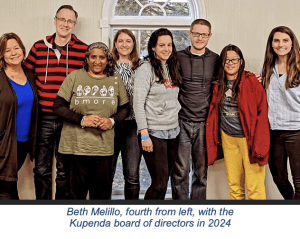From Summer Camp to Global Advocacy: A Journey Toward Disability Inclusion
by Kupenda
Posted on June 24, 2025
By, Beth Melillo
Beth Melillo is an organizational development and change management specialist with an M.S. degree in industrial-organizational psychology and a B.A. in English. She regularly leads change and transformation through people, systems, and strategy. She currently contributes her time, talent, and passion for supporting people with disabilities as the secretary on Kupenda’s board of directors.
Growing up, I didn’t have much exposure to people with disabilities. It wasn’t that I was intentionally avoiding it—it just wasn’t part of my daily experience. That changed when I was eighteen and stepped into a world I hadn’t known before. What began as a summer job quickly turned into a deeply formative experience, one that opened my eyes, challenged my assumptions, and has sparked a lifelong commitment to inclusion and advocacy.
My First Exposure to People with Disabilities
When I was eighteen, I got a job at a summer camp in Massachusetts called Grotonwood, working with adults with developmental disabilities. I can still remember doing the interview for a camp counselor role, where you would alternate one week working as a counselor for kids and one week working with adults with “special needs.” The tiny back office where I met the camp director for the interview was dark, wood-paneled, and piled high with recreation equipment. I was asked, “Do you have any experience working with people with ‘special needs?” and answered, “No.” The camp director told me, “That’s okay–it’s really more about attitude than it is about experience in this role. If you have the right attitude, we can train you.”
That summer was my first time engaging with people with Down syndrome, cerebral palsy, and a range of developmental and physical disabilities. One of the people who really made an impression on me was a woman with Down syndrome. She had a particular phrase she used to repeat a lot; as she gave you a side hug, she would say, “I keep you.” I was impressed with the humor, patience, and loving nature of the campers, and I really enjoyed working with this open and loving group of people.
Over the summer, I learned more about the type of mindset and attitude that was needed in this role. It involved focusing on people, not their diagnoses; using person-first language (i.e., “person with a disability” rather than “disabled person”); and being respectful–directly addressing those with disabilities, not their caretaker or advocate. I continued to work at the camp for five more summers.
Building a Lifelong Commitment to Disability Inclusion
After I graduated from college, I wasn’t sure what I wanted to do for full-time work. Fortunately, a fellow counselor I had known from Grotonwood asked if I was interested in working as a direct support professional at Bridgewell, a health-and-human-services provider on Boston’s North Shore. I agreed to give it a try.
Over the three years that I worked there, I learned so much about supporting people’s goals, listening, and providing fun and structure for people of all abilities to be fully supported in gaining independence. I learned about the importance of community inclusion, the historical roots of how people with disabilities have been treated in institutions, and the transition to different models of support.
Ultimately, I’ve gone on to do other professional work, but those early work experiences where I engaged with a variety and diversity of people of all manner of abilities shaped the way I see the world. It opened my eyes to the need to create a world that is fully accessible, supportive, and inclusive for people of all abilities.
Kupenda’s Model of Disability Support
I first heard about Kupenda around 2007, during a camping trip with friends where Cindy Bauer, the founder and CEO, joined us. Her passion for the work and her explanation of the challenges the children in Kilifi County, Kenya, faced surrounding disabilities really made an impression on me. I started contributing just a small amount of support each month to the organization, something that felt doable on my low salary and that I was confident that would make an impact in someone’s life.

Over the years, I’ve continued supporting Kupenda, and I’ve also come to appreciate so much more about the organization beyond the work they do providing education and medical programs. I particularly value how their stigma reduction programs are community-based and data-informed. They regularly evaluate their programs for impact and make adjustments using data collected and evidence-based approaches from the World Health Organization (WHO) and the United Nations Children’s Fund (UNICEF). They also work with local leadership to develop and deliver tailored advocacy workshops. I value how they work directly with these change agents and leaders, who are best positioned to impact and change the lives of this vulnerable population.
As a result of these beliefs and practices, I decided to join the board of directors in 2024. I’m excited to collaborate with other staff, supporters, and communities to continue spreading the important message that “disability is not inability.” My journey began with a single step into the unknown, and it’s led me to a deep belief in the power of inclusion and community. Kupenda’s work continues to inspire me because it is rooted in dignity, data, and deep relationships. Their programs aren’t just compassionate—they’re evidence-based, rigorously evaluated, and proven to reduce stigma and improve outcomes for children with disabilities. If you’re moved by this story or by the idea that every child—regardless of ability—deserves opportunity and belonging, I invite you to learn more, follow Kupenda’s work, and consider becoming a supporter. Even a small contribution or a shared post can make a meaningful difference in the life of a child.
Want to keep updated on Kupenda’s work?
Follow us on Facebook, Instagram, LinkedIn, TikTok, YouTube, and X.
Learn more about Kupenda in our podcast.
Sign up for our newsletter.
Or support a child in need for just $35 / month.




Leave a Reply